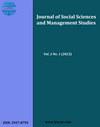冈比亚公司治理与银行资本充足率:政治的调节作用
引用次数: 0
摘要
银行倒闭和银行业危机给各利益相关者带来了恐惧和焦虑;全球银行倒闭的一些遥远原因是公司治理结构和实践薄弱/糟糕,信用风险;政府资本重组监管;贪污、挪用银行资产;法律/监管和政治制度薄弱。资本不足是银行资本不足以抵御金融冲击的征兆。基于利益相关者制度理论;和二手数据,以及一般线性模型,本研究调查了政治对冈比亚银行业董事会有效性,管理效率和资本充足率之间关系的调节影响,同时控制财务杠杆。研究发现:冈比亚政治稳定与董事会风险管理有效性的交互作用对银行资本充足率有显著的负向影响;冈比亚政治稳定与利润最大化管理效率的交互作用对银行资本充足率有显著的正向影响;财务杠杆对冈比亚银行资本充足率有显著的正向影响;董事会风险管理有效性对冈比亚银行资本充足率有显著的正向影响;利润最大化的管理效率对冈比亚银行资本充足率有显著的负向影响。本研究建立了共同利益相关者-制度理论的相关性。该报告建议冈比亚的所有政治利益相关者都应努力稳定该国的政治制度,冈比亚银行董事会应确保其管理团队在宣布利润时采用审慎和最佳的银行做法。这是因为在正常情况下,正利润会增加银行的资本充足率。本文章由计算机程序翻译,如有差异,请以英文原文为准。
Corporate Governance and Banks’ Capital Adequacy in Gambia: The Moderating Impact of Politics
Bank failures and banking crises create fears and anxieties in various stakeholders; and some of remote causes of bank failures across the globe are weak/poor corporate governance structures and practices, credit risk; government recapitalization regulation; corruption and embezzlement of banks’ assets; and weak legal/regulatory and political institutions. Undercapitalization is a symptom of banks’ capital inadequacy to withstand financial shock. Anchored on stakeholder-institutional theory; and secondary data, and general linear model, this study investigated the moderating impact of politics on the relationship between board effectiveness, management efficiency and capital adequacy of Gambia’s banking sector while controlling for financial leverage. The studied established that: the interaction of political stability and board effectiveness in risk management has significant negative effect on banks’ capital adequacy in Gambia; the interaction of political stability and management efficiency in profit maximization has significant positive effect on banks’ capital adequacy in Gambia; financial leverage has significant positive effect on banks’ capital adequacy in Gambia; board effectiveness in risk management has significant positive effect on banks’ capital adequacy in Gambia; and management efficiency in profit maximization has significant negative effect on banks’ capital adequacy in Gambia. The relevance of the joint stakeholder-institutional theory was established in this study. The work recommends that all political stakeholders in Gambia should strive to stabilize the country’s political system, and that the board of directors of banks in Gambia should ensure that their management teams apply prudent and best banking practices in declaring profit. This is because a positive profit should increase the capital adequacy of banks in a normal situation.
求助全文
通过发布文献求助,成功后即可免费获取论文全文。
去求助
来源期刊

Journal of Social Sciences and Management Studies
Social Sciences and Management Studies-
自引率
0.00%
发文量
0
期刊介绍:
Journal of Social Sciences and Management Studies (ISSN: 2957-8795) is a peer reviewed journal focuses on integrating theory, research and practice in the area of management and social sciences. The journal discusses the distinctive disciplinary practices within the sciences of the management and social field and examines examples of these practices. In order to define and exemplify disciplinarity, the journal fosters dialogue ranging from the broad and speculative to the microcosmic and empirical. In considering the varied interdisciplinary, trans-disciplinary or multidisciplinary work across and between the social, natural and applied sciences, the journal showcases interdisciplinary practices in action. The focus of papers ranges from the finely grained and empirical, to wide-ranging multi-disciplinary and transdisciplinary practices, to perspectives on knowledge and method.
 求助内容:
求助内容: 应助结果提醒方式:
应助结果提醒方式:


